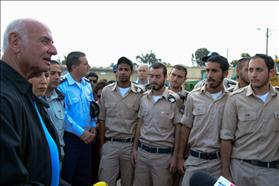Finding the right balance
The ultra-Orthodox draft: a choice between equality and justice
Will the Equality in Sharing the Burden Law achieve the goal stated by its very name? Hiddush VP Shahar Ilan discusses the development of one Israel's hottest political issues and the need for smart solutions in enforcing the law.
18/02/2014 14:03
Tags: equality in sharing the burden · IDF · Peri Law · Habayit Hayehudi · Yesh Atid

Minister Yaakov Peri of Yesh Atid, chair of the Committee for Implementing Equality in Sharing the Burden, meets ultra-Orthodox soldiers on an Israeli Air Force base. Photo: Yosi Zeliger/Flash90
It is hard to think of a more difficult and emotional debate dividing Israeli society than the one about ultra-Orthodox yeshiva students allowed to defer military service, while the non-Orthodox are forced to enlist. The fact that in order to defer their military service, the students must stay in their yeshivas and refrain from working also causes great damage to Israel’s society and economy. About 60% of Haredi (ultra-Orthodox) men do not work. Election campaigns have been decided on promises to end this discrimination, but they were never kept - both because of the great political power of the ultra-Orthodox and of the immense difficulty in recruiting an entire community by force.
The Haredi public claims that studying Torah is the sole purpose of Jewish life and therefore an exemption should be granted to any man studying in a yeshiva. In its view, studying the Torah, and not military service, is what really defends Israel. Another reason, and probably the most important one, is the fear that young Haredim will be exposed to secular influences in the army and abandon religion. But while it’s relatively easy to enforce the draft on individual evaders, a democracy is almost helpless against the organized draft evasion of an entire community. In recent years, a slow process has started of drafting ultra-Orthodox boys.
This year, 2,000 are expected to enlist. Eighteen months ago, the Israeli High Court struck down the Tal Law, which allowed the state to grant deferment to yeshiva students, citing the very slow pace of the recruitment process. Next month, a Knesset committee is scheduled to conclude preparation of a new bill for an ultra-Orthodox draft. The bill is stirring a fierce debate, not only between the coalition and the ultra-Orthodox parties in the opposition, but also within the coalition itself.
The bill has come in for sharp criticism from many directions, inter alia because it includes an extended transition period and compulsory military service for yeshiva students will only come into effect in 2017, at the earliest. This means implementation of the law will be passed to the next Knesset, with a new government which might include the ultra-Orthodox parties. Such a government might change or repeal the law. Until 2017 there will be non-binding draft goals, which in 2016 will reach 3,200 yeshiva students for military service and another 2,000 for civilian community service.
The main debate within the ruling coalition centers around the question of what happens if the target numbers aren’t met and a compulsory draft comes into effect.
If the targets are met during the transition period, a general draft will not be applied. Instead, new quotas will be set. Israeli society has a definite interest in these goals being met, achieving a consensual solution to the sensitive issue. But the law will only apply to those under the age of 18. All yeshiva students aged 18 to 28 at the time the law is enacted will receive exemptions from military service and will be able to enter the labor market.
The harsh criticism of this mass exemption is twofold. This clause is unjust and immoral and will create a disincentive for yeshiva students to serve. Therefore, the yeshivot will not be able to meet their recruitment quotas and the law will self-destruct.
The main debate within the ruling coalition centers around the question of what happens if the target numbers aren’t met and a compulsory draft comes into effect. What kind of sanctions will be used to enforce it? The centrist Yesh Atid party is demanding criminal sanctions, meaning imprisonment, just like the punishment for non-Orthodox draft dodgers. The party’s chairman, Yair Lapid, even announced that absent criminal sanctions, Yesh Atid would bolt the coalition, effectively toppling the government. Representatives of the Haredi community have made clear that criminal sanctions would serve as a declaration that Torah studies are a criminal offense, and a host of experts, including this writer, have warned that yeshiva students will prefer to go to jail en masse and turn the prisons into yeshivot. So not only will criminal sanctions not increase equality, it is unlikely that they will even stop the current recruitment process.
Committee Chairman MK Ayelet Shaked of the Jewish Home (Habayit Hayehudi) party, however, has proposed economic sanctions: Yeshiva students who don’t serve in the army will not receive government stipends, housing benefits and other assistance. Haredi MKs have made clear they would go along with this suggestion.
This is the choice that Israel is now facing: A just, but unrealizable bill by Yesh Atid that will lead to a greater social rift, or a smart bill, even if not the most just, by Habayit Hayehudi, that will not bring equality, but will bring it closer.
This article originally appeared in i24 News.